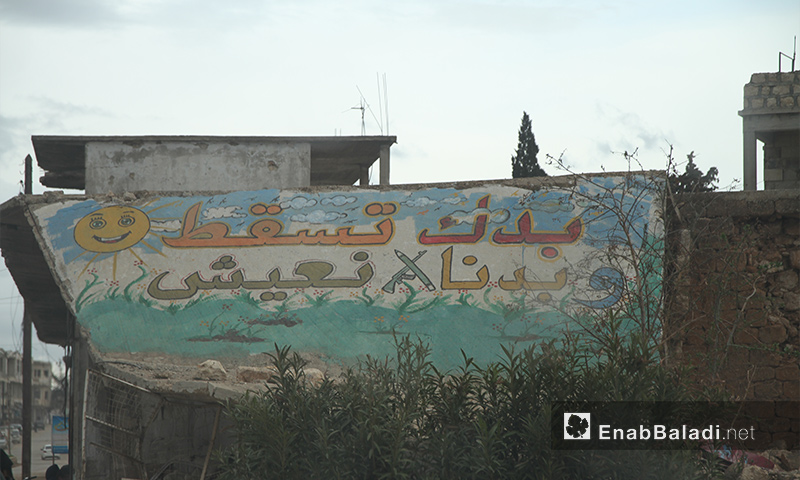



To the same scene, which Syrians have been living in since the first moments of the Syrian Revolution, the fingerprints of the ‘Spry Man’ return to Idlib with the same force and style, despite the changes of the circumstances and the dominant power on the ground. In the broad daylight and under the cover of the night, he hastily wrote expressions on the walls of the province receiving a wide interaction in the past a few days.
The public recognized the phenomenon through the pictures that activists from Idlib have been publishing. Most of the graffiti drawings welcome the Turkish intervention in the governorate, faced by counter drawings of the dominant party in Idlib, Hayat Tahrir al-Sham, showing a refusal of Ankara and Moscow’s operation in the region.
Idlib’s walls, in northwestern Syria, were not empty of indicative phrases, which have been drawn by activists to highlight military, life, and even religious matters. The phrases they wrote varied; some of them were critical of the military factions or biased to them, other phrases called for reform. However, all these drawings disappeared under a white paint without the slightest interest.
Since the beginning of the Syrian Revolution, the ‘Spry Man’ has carried the demands of the people in his mind to spread them on walls in the form of colored expressions using spray paint. Ayman Ashour, an activist from Idlib, who has been a friend to the spray can since 2011, said that “We waited until very late hours of the night, when people would have been asleep and the streets empty, to start carrying messages after studying our movements and dividing the roles”.
Between the past and the present, the preparations for spraying the walls might have been changed, but the consequences are not that changed. To Enab Baladi, Ayman continues to say that “The situation has changed, and I do not think that the difficulties are the same. Despite the easy movement, the fear of being arrested remains to control the work of those who do graffiti”.
The son of kafranbel, a town in Idlib Governorate, and the activist Mohammed Salloum, considers that “Writing phrases on the walls is the used method and almost the only one, in addition to leaflets upon facing the strongest opponent”.
Commenting on the case of Idlib, Mohammed says to Enab Baladi that “Hayat Tahrir al-Sham controls Idlib the way the Syrian Regime controlled it in the beginning of the revolution,” explaining that “the only way to show our objection is by working secretly to avoid being arrested”.
The people enthusiastically receive the sprayed phrases because they express the real concerns they have and do not own the courage to declare, according to the activist, who adds that “as long as the ‘Spray Man’ is invisible and does not appear, then he is not among those who seek positions”.
According to Mohammad, the people do not care to know the one who is drawing the phrases for “their only concern is the one who speaks for them”.
Some people say that the return of the ‘Spray Man’ carries certain indications and messages for most of the phrases that have been spreading in Idlib tackle the Turkish intervention, others criticize Hayat Tahrir al-Sham and wonder why the shelling of Kafriya and al-Fo’a was avoided while Idlib has been under an intensive shelling for the past a few days.
Kamal Abu al-Majd, an activist from the city of Hama in west-central Syria, and living Idlib, tells Enab Baladi that the phrases filling the city’s walls “stem from the sense of freedom that the people have sacrificed to attain; they also reject some of the happenings in the liberated areas as a result of the military factions’ tyranny against civilians or the political decisions that do not represent them”.
This method of expression “has brought the spirit of revolution back into the hearts of the people,” according to Abu al-Majd, who considers it as “a message to whoever governs a region with the power of iron and fire, that the people will not bow to any faction no matter how many victories it achieves as long as it oppresses the people”. He continues to say that “who went against Assad will not fail to do so against others”.
Ibrahim Halaq, a resident of the city of Idlib, sees the situation from another angle; he considers the phrases on the walls as “a war between the ‘Spray Man’ and his executioner”.
To Enab Baladi, Ibrahim says that writing the phrases on the walls and erasing them after a few hours or on the next day is an act that has a sense of challenge between two sides. He continues to say that “During the Assad’s reign and today patrols are allocated to check the walls and to erase statements opposing to a certain party, stressing the impact they are leaving”.
The activists agree that biggest interaction they received since years was about the expressions tackling the Turkish intervention on the morning of September 21, the expressions which welcomed the participation of Turkey in a military operation against Hayat Tahrir al-Sham, which have been substituted by the following: “Turkey.. Blood and Destruction”.
if you think the article contain wrong information or you have additional details Send Correction